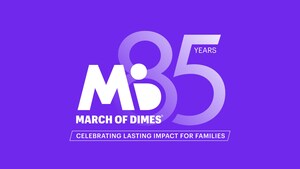Nacersano.org Helps Hispanic Moms Have Healthy Babies
Thalia helps March of Dimes raise awareness about preventable birth defects
WHITE PLAINS, N.Y., March 18, 2014 /PRNewswire-USNewswire/ -- Hispanic women have babies at a greater rate each year than any other racial or ethnic group in the United States, making this population the fastest growing group. And now, Spanish-speaking women and families can easily find much-needed information on how to have a healthy pregnancy and a healthy baby online at nacersano.org.
"I feel so privileged as a mom to be part of a significant organization like the March of Dimes that works hard to prevent prematurity and helps moms to have healthy babies," says Thalia, Latin Grammy Award winning artist and mother of two young children. "I'm very happy that the March of Dimes has even more resources available to continue to educate moms and families worldwide. As a mom, I can't think of anything more important than the health of our children."
As a global ambassador for the March of Dimes, Thalia lends her voice to health awareness campaigns for moms and moms-to-be. She is now helping to get the word out about nacersano.org, March of Dimes newest online resources for Spanish-speaking families.
Nacersano.org, the March of Dimes Spanish-language site, offers valuable information on the specific health needs of the Hispanic community, including on the importance of folic acid, a B vitamin that helps prevent serious birth defects of the brain and spine known as neural tube defects (NTDs).
Babies born to Hispanic women are about 20 percent more likely to have a neural tube defect than non-Hispanic white women. While this disparity is not well understood, one reason may be that Hispanic women have a lower intake of folic acid. In the United States, wheat flour is fortified with folic acid, but corn masa flour is not.
The March of Dimes, through its educational print and online initiatives, is working to raise awareness about the need for folic acid among Hispanic women. All women of childbearing age, whether or not they're planning to get pregnant, should take a multivitamin with 400 micrograms of folic acid every day, beginning before pregnancy and continuing into the early months of pregnancy. This is the best way to get the recommended amount of folic acid to prevent NTDs. Eating foods rich in folate (the natural form of folic acid) or fortified with folic acid is another way to consume this essential vitamin.
Visitors to nacersano.org can find dozens of recipes from various Latin America cultures that provide at least 10 percent of the recommended daily amount of folic acid. Users can also submit their own folic acid rich recipes to the site.
"It's such an easy thing to make folic acid a part of your daily routine, and it can provide a major benefit to your future family," says José F. Cordero, MD, MPH, dean of the School of Public Health University of Puerto Rico and a member of the March of Dimes national Board of Trustees. "About half of pregnancies are unplanned, so women should take folic acid daily to give your babies the healthiest start in life."
Although fortification of enriched cereal grains such as bread and pasta with folic acid was mandated by the U.S. Food and Drug Administration in 1998, the rule does not include corn masa flour. Neural tube defects have decreased since fortification took effect; however, about 3,000 pregnancies in the U.S. each year still are affected by NTDs, and Hispanic babies have the highest rate.
Nacersano.org also features hundreds of health articles, an ovulation and due date calculators, and educational videos to help Hispanic women and families be healthy before, during and after pregnancy.
Visitors can also ask questions about folic acid and nutrition, preconception, pregnancy and baby health. March of Dimes health experts provide personalized answers by email within 48 hours in Spanish and English. Visitors can also sign up to receive monthly free newsletters on preconception and pregnancy health, read and comment on the blog, and stay connected through various social media channels.
"Nacersano.org stands apart from other websites. For nearly 20 years, the March of Dimes has been the trusted source of maternal and infant health information to Hispanic women and families worldwide," says Lilliam Sanchez, March of Dimes director of Latino Outreach. "We are truly committed to this community and will continue to provide this much needed service, and more."
"Like" us at www.Facebook.com/nacersano and follow us on @nacersano and @nacersanobaby on Twitter.
For more than 75 years, moms and babies have benefited from March of Dimes research, education, vaccines, and breakthroughs. Find out how you can help raise funds to prevent premature birth and birth defects by walking in March for Babies at marchforbabies.org. The 2014 March for Babies is sponsored nationally by the March of Dimes number one corporate supporter Kmart, Macy's, Famous Footwear, Cigna, Sanofi Pasteur, Mission Pharmacal, United Airlines and Actavis.
SOURCE March of Dimes
WANT YOUR COMPANY'S NEWS FEATURED ON PRNEWSWIRE.COM?
Newsrooms &
Influencers
Digital Media
Outlets
Journalists
Opted In





Share this article